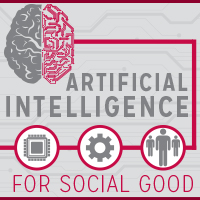 The organizing committee for the AI for Social Good Workshop has released their workshop report called Artificial Intelligence for Social Good.
The organizing committee for the AI for Social Good Workshop has released their workshop report called Artificial Intelligence for Social Good.
The Computing Community Consortium (CCC), along with the White House Office of Science and Technology Policy (OSTP), and the Association for the Advancement of Artificial Intelligence (AAAI), co-sponsored this workshop in June 2016 in Washington, DC. This was one of five workshops that OSTP co-sponsored and held around the country to spur public dialogue on artificial intelligence, machine learning, and to identify challenges and opportunities related to AI.
The workshop highlighted successful deployments of AI systems directed at addressing specific societal needs. Subsequent discussions explored broader questions as to how the use of AI technologies could be enabled and expanded in several areas of broad societal benefit. The new report focuses on the four areas as well as cross-cutting issues that are common to advancing all of them. The four areas are:
Urban Computing– The urban computing workshop session focused primarily on transportation networks, the goal being to use AI technology to improve mobility and safety. We envision a future in which it is significantly easier to get people to the things they need and the things they want, including, but not limited to, education, jobs, healthcare, and personal services of all kinds (supermarkets, banks, etc.).
Sustainability– Sustainability can be interpreted broadly to include all aspects of sustainable biological, economic, and social systems that support human well being. The report focus primarily on the ecological component, but the larger issues of social and economic sustainability must be considered as well.
Health– The grand challenge for AI and health is to develop a learning healthcare system. This is a sustainable system that is able to observe all the available data about a person, build appropriate models from the observations, help make the right decisions using all available AI technologies, proactively and reactively make the right interventions and care when the person needs it, re-capture the results of the intervention, and learn and adapt from the feedback.
Public Welfare– AI has a lot of potential to greatly impact fundamental issues our society faces today, such as education, public health, economic development, criminal justice reform, and public safety. Some of these are explored in the report.
Like many technologies before it, AI is a family of tools that will find their way into a broad spectrum of applications, many of which we cannot today imagine. However, as the report demonstrates, with appropriate forethought and incentives, AI can become a tool that enhances our quality of life at a personal, national, and global level.
In order to further the discussion of the benefits of AI to society, the CCC is co-sponsoring the AAAI 2017 Spring Symposium on AI for Social Good at Stanford University. This symposium will focus on the promise of AI across multiple sectors of society. This is one of several symposia in the AAAI 2017 Spring Symposium series. The event will be live streamed here.









